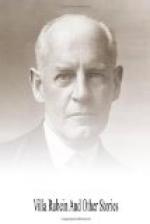Greta, pulling Scruff’s ears, would gaze up at the speakers; when the talk was over, she always shook herself. But if no one came to the “sittings,” there would sometimes be very earnest, quick talk, sometimes long silences.
One day Christian said: “What is your religion?”
Harz finished the touch he was putting on the canvas, before he answered: “Roman Catholic, I suppose; I was baptised in that Church.”
“I didn’t mean that. Do you believe in a future life?”
“Christian,” murmured Greta, who was plaiting blades of grass, “shall always want to know what people think about a future life; that is so funny!”
“How can I tell?” said Harz; “I’ve never really thought of it—never had the time.”
“How can you help thinking?” Christian said: “I have to—it seems to me so awful that we might come to an end.”
She closed her book, and it slipped off her lap. She went on: “There must be a future life, we’re so incomplete. What’s the good of your work, for instance? What’s the use of developing if you have to stop?”
“I don’t know,” answered Harz. “I don’t much care. All I know is, I’ve got to work.”
“But why?”
“For happiness—the real happiness is fighting—the rest is nothing. If you have finished a thing, does it ever satisfy you? You look forward to the next thing at once; to wait is wretched!”
Christian clasped her hands behind her neck; sunlight flickered through the leaves on to the bosom of her dress.
“Ah! Stay like that!” cried Harz.
She let her eyes rest on his face, swinging her foot a little.
“You work because you must; but that’s not enough. Why do you feel you must? I want to know what’s behind. When I was travelling with Aunt Constance the winter before last we often talked—I’ve heard her discuss it with her friends. She says we move in circles till we reach Nirvana. But last winter I found I couldn’t talk to her; it seemed as if she never really meant anything. Then I started reading—Kant and Hegel—”




